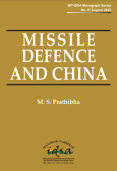India-China Relations: Scenario 2014
The India-China relations in 2013, in spite Depsang incident, had a more positive than negative tone. Premier Li chose India as his first overseas stop and the pronouncement to deepen ties with India as “strategic choice” along with promise to make “greater efforts” to resolve boundary issue. Equally positive voice came from the Indian leadership for rejecting the relevance of “containment” in favour of “cooperation” that could bring more gains instead.
- P. Stobdan
- December 30, 2013











